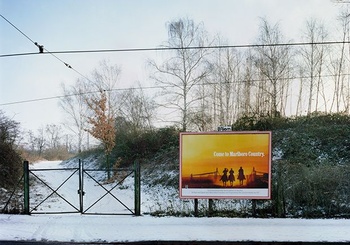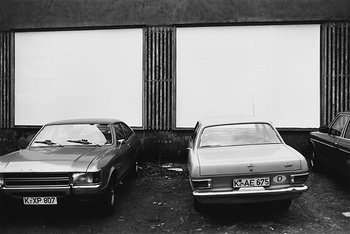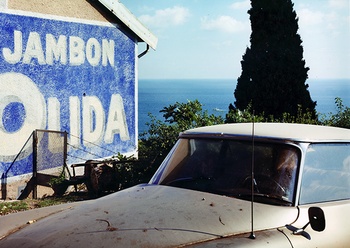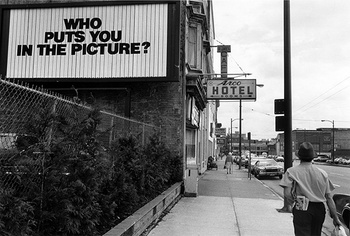Tor #1996, L.B. Köln © Max Regenberg courtesy Galerie Thomas Zander, Cologne
“Come to Marlboro Country”: virile cowboys gallop across the American prairie in the perpetual, warm glow of dusk, touting cigarettes as they go. Max Regenberg photographed the sunset on the enormous billboard in a snowy landscape somewhere in his hometown of Cologne. The German photographer likes contrasts: the fantasy that the advert reflects versus the reality of the surrounding urban landscape. “I was trained as an advertising photographer, but I soon decided to try something different,” Max Regenberg tells us on the eve of the opening of his retrospective exhibition at Fondation A Stichting. He is not a tall man, and his long greying hair is untidily tied together. He talks about his project passionately and with much gesticulation. “In 1977, I moved to Ottawa in Canada. What a culture shock! There were all these enormous billboards on the streets with blaring ad campaigns. At that time Germany still only had state television, but Canada already had commercial TV stations with advertising breaks. But it was an exhibition by August Sander, Eugène Atget, and Walker Evans that signaled a definitive turn in my career. Their work fundamentally changed my perspective on photography. For the first time, I went outside and started photographing the urban environment, like Atget. When I returned to Germany, I became fanatical about the history of photography. What did I know about the kind of photography in galleries? Not much. I devoured photo magazines and that’s how I found the iconic exhibition ‘New Topographics: Photographs of a Man-Altered Landscape.’ Their view of the landscape – focusing on the banal and the everyday – I definitely identified with that.”
Max Regenberg: picture of a picture


Ohne Titel - 1979, L.B. System Köln © Max Regenberg courtesy Galerie Thomas Zander, Cologne
Why is the billboard such an important motif?
Max Regenberg: In the late 1970s, ad men decided photos were better to tout their products than drawings. That shift in imagery coincided with a redrawing of the political landscape. Margaret Thatcher in England, Ronald Reagan in the United States, and Helmut Kohl in Germany invested everything in the economisation of society. Billions were pumped into the economy and people were encouraged to consume. Advertising on billboards was the best way to make people want to buy things. And billboards changed the appearance of the urban landscape. I wanted to capture something of that social change and the transformation from a literary to a visual culture.
Why is the billboard such an important motif?
Max Regenberg: In the late 1970s, ad men decided photos were better to tout their products than drawings. That shift in imagery coincided with a redrawing of the political landscape. Margaret Thatcher in England, Ronald Reagan in the United States, and Helmut Kohl in Germany invested everything in the economisation of society. Billions were pumped into the economy and people were encouraged to consume. Advertising on billboards was the best way to make people want to buy things. And billboards changed the appearance of the urban landscape. I wanted to capture something of that social change and the transformation from a literary to a visual culture.

Jambon Olida #1991, L.B. Köln © Max Regenberg courtesy Galerie Thomas Zander, Cologne
You also photograph in colour, was that a new challenge?
Regenberg: No, thanks to my training as an advertising photographer, I was used to colour. There is no hierarchy to me, and I wanted to photograph the environment in colour too. Many people disagreed with me. Opting for colour was considered an offence and was thought to be vulgar or common. But all the advertising was in colour too, and I didn’t want to introduce an extra abstraction to the image. I wanted my image to represent reality as much as possible. The American photographer Lewis Baltz eventually did the same, but I opted to use colour very early.
You also photograph in colour, was that a new challenge?
Regenberg: No, thanks to my training as an advertising photographer, I was used to colour. There is no hierarchy to me, and I wanted to photograph the environment in colour too. Many people disagreed with me. Opting for colour was considered an offence and was thought to be vulgar or common. But all the advertising was in colour too, and I didn’t want to introduce an extra abstraction to the image. I wanted my image to represent reality as much as possible. The American photographer Lewis Baltz eventually did the same, but I opted to use colour very early.

Who puts you in the picture? #1981, L.B. System Vancouver © Max Regenberg courtesy Galerie Thomas Zander, Cologne
Is it true that initially, very few people were interested in photos like this?
Regenberg: I worked for 25 years without ever showing my photos to anyone. People weren’t interested in images like this, but I had this tenacious idea that they were important. I sensed that images were becoming more important and that was the root of my work. I absolutely wanted to document the evolution to a visual, image-based society.
Max Regenberg: Fair Use > 6/7, do/je/Th > zo/di/Su 13 > 18.00, FONDATION A STICHTING, avenue Van Volxemlaan 304, Vorst/Forest, 02-502.38.78, www.fondationastichting.be
Is it true that initially, very few people were interested in photos like this?
Regenberg: I worked for 25 years without ever showing my photos to anyone. People weren’t interested in images like this, but I had this tenacious idea that they were important. I sensed that images were becoming more important and that was the root of my work. I absolutely wanted to document the evolution to a visual, image-based society.
Max Regenberg: Fair Use > 6/7, do/je/Th > zo/di/Su 13 > 18.00, FONDATION A STICHTING, avenue Van Volxemlaan 304, Vorst/Forest, 02-502.38.78, www.fondationastichting.be
Read more about: Expo
Fijn dat je wil reageren. Wie reageert, gaat akkoord met onze huisregels. Hoe reageren via Disqus? Een woordje uitleg.